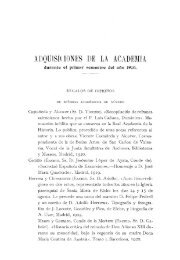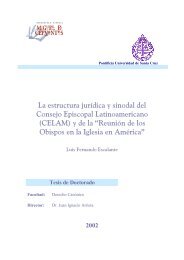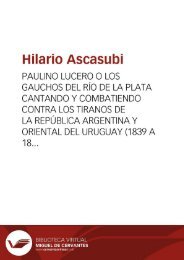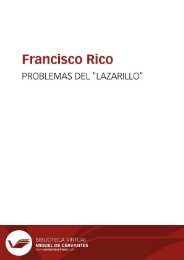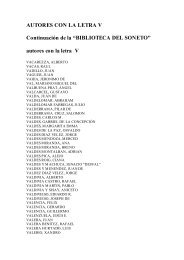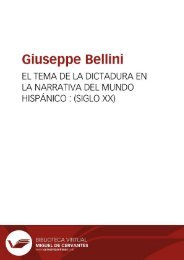You also want an ePaper? Increase the reach of your titles
YUMPU automatically turns print PDFs into web optimized ePapers that Google loves.
Anales galdosianos [Publicaciones periódicas]. Año XII, 1977<br />
on the side of disorder, existence conflicts with ethics. If the victory in this world, in this novel, is not<br />
Máximo Manso's, it belongs to his creator, but certainly not to Manolo or to José María, appearances<br />
notwithstanding. By temperament and talent Máximo was unable to enter the reigning bourgeoisie's<br />
power structure: that is to his credit.<br />
We must of course concede that this morally and intellectually superior individual is constitutionally<br />
defective in terms of the demands placed on him by his historical circumstance. As a man of his time,<br />
measured by his practical achievements, among which the acquisition of a new wet nurse is probably<br />
his most momentous, Manso does not loom large. When we fathom the narration's ironic distance,<br />
however, Manso's insignificance can be taken at face value no more than the assertion that this book<br />
is « un trabajillo de poco aliento » (1, 3), for he is never fully disengaged from his literariness.<br />
If Manso's trajectory describes the self-creation of a fictional character, then his fictionality is the<br />
realization of a goal. To transcend that fictionality into life would devalue it. Newton, in her study<br />
(p. 125), already sensed El amigo Manso's overriding implication: that literature carries with it an<br />
immanence of meaning that lived experience cannot hold 154 . Correa accurately conveys the idea<br />
contained in the text:<br />
eternal and the profound and that Máximo is the enabling agent of Peña's triumph, she need not have<br />
been so hesitant in designating Manso's failure as relative. And, out of sympathy as I must confess<br />
to being with Pattison's approach to the novel, I heartily agree with his conclusions about Máximo:<br />
«He has indeed been manso with all the meekness, docility, and lack oi virile spirit which this word<br />
connotes. But if, as he states, there is something above and beyond the facts and events of everyday<br />
life, he can console himself in the knowledge that in this superior realm he still holds the advantage.<br />
Now he is manso in another sense: the bellwether who leads the stupid sheep. The man of action<br />
carries off the superficial and transitory victories; the man of thought moves in the world of truth and<br />
is the guide of society towards a better organization in which egoism and individualism will no longer<br />
corrupt the ideal» (p. 148).<br />
154 In comparing El amigo Manso to an Anatole France novel (« Le Crime de Sylvestre Bonnard ,<br />
a Possible Source for El amigo Manso », Symposium , 17 [1963], 123-29), Monroe Z. Hafter has<br />
noticed that in a juxtaposition of fiction and reality, the imaginary may prove to be the more real<br />
of the two. Máximos contradictory nature as a self-conscious fiction of flesh and blood leads Hafter<br />
to conclude that the ultimate battle on the level of action and practical resolution is won by the<br />
figment of the imagination. Had Hafter and Russell gone far enough into <strong>Galdós</strong>' game playing to<br />
detail the supremacy of fiction, they would have been able to resolve the contradiction of Máximo's<br />
112





